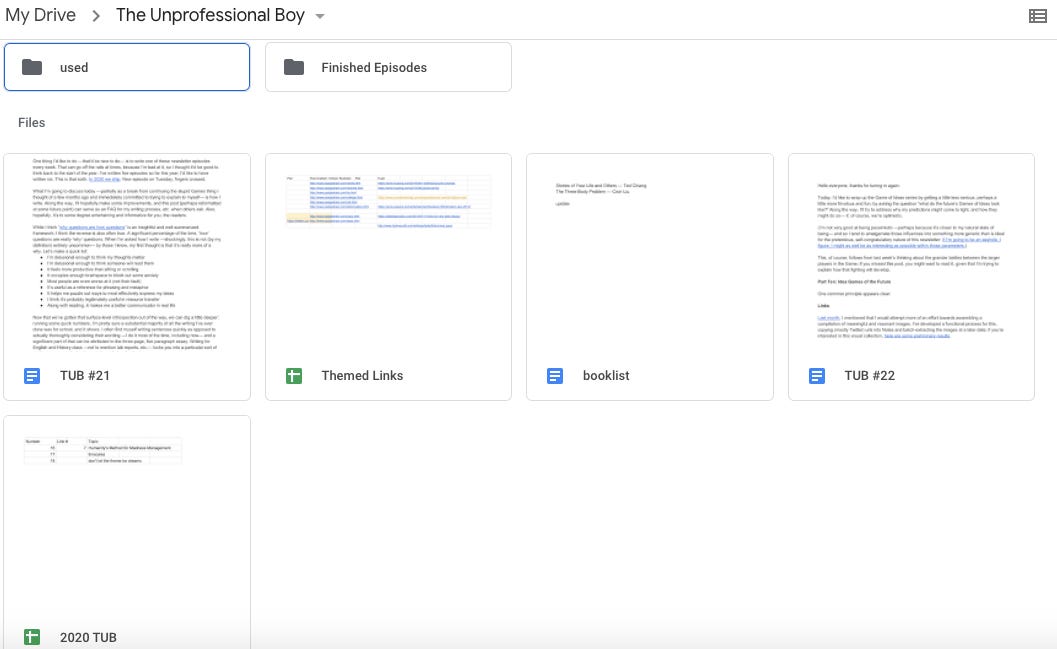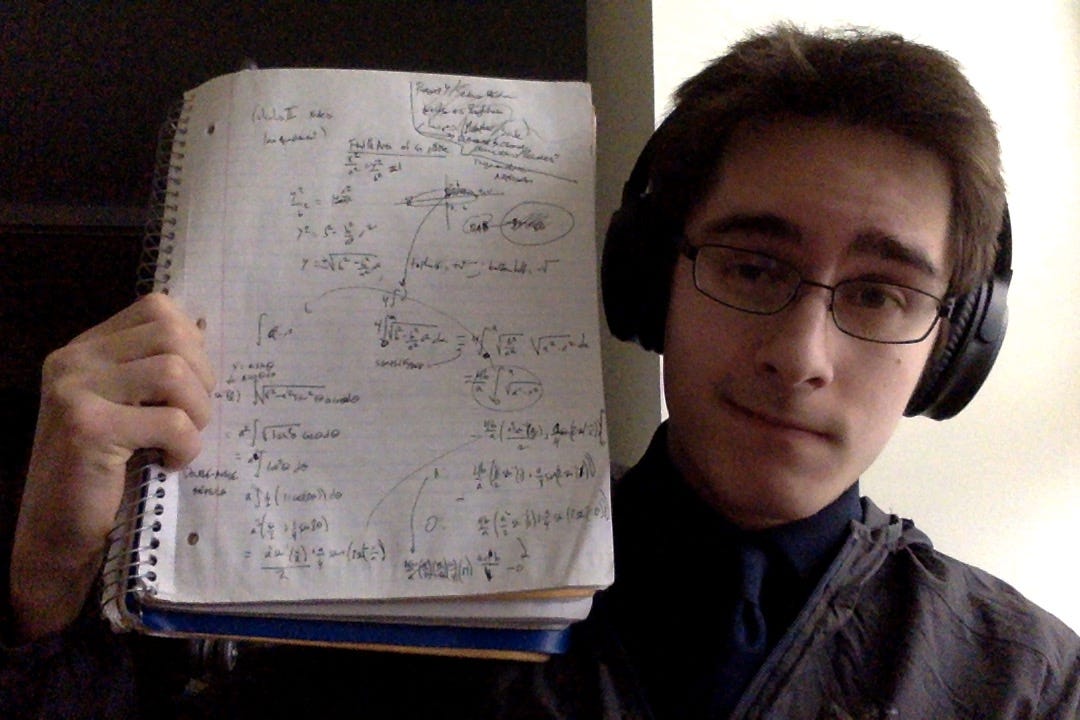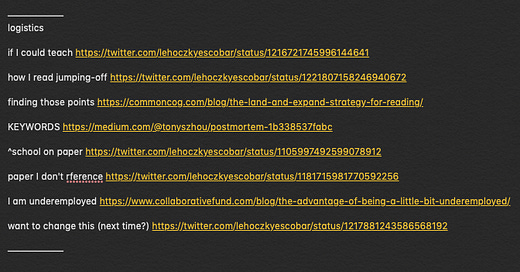Hello, everyone,
One thing I’d like to do —that’d be nice to do— is to write one of these newsletter episodes every week. That can go off the rails at times, because I’m bad at it, so I thought it’d be good to think back to the start of the year: I’ve written five episodes so far this year; I’d like to have written six. This is that sixth. In 2020 we ship. New episode on Tuesday, fingers crossed.
What I’m going to discuss today —partially as a break from continuing the stupid Games thing I thought of a few months ago and immediately committed to trying to explain to myself— is how I write. Along the way, I’ll hopefully make some improvements, and this post (perhaps reformatted at some future point) can serve as an FAQ for my writing process, etc. when others ask. Also, hopefully, it’s to some degree entertaining and informative for you, the readers.
Why I Write
While I think “why questions are how questions” is an insightful and well-summarized framework; I think the reverse is also often true. A significant percentage of the time, ‘how’ questions are really ‘why’ questions. When I’m asked how I write —shockingly, this is not (by my definition) entirely uncommon— by those I know, my first thought is that it’s really more of a why. Let’s make a quick list:
I’m delusional enough to think my thoughts matter
I’m delusional enough to think someone will read them
It feels more productive than sitting or scrolling
It occupies enough brainspace to block out some anxiety
Most people are even worse at it (not their fault)
It’s useful as a reference for phrasing and metaphor
It helps me puzzle out ways to most effectively express my ideas
I think it’s probably legitimately useful in resource transfer
Along with reading, it makes me a better communicator in real life
Now that we’ve gotten that surface-level introspection out of the way, we can dig a little deeper: running some quick numbers, I’m pretty sure a substantial majority of all the writing I’ve ever done was for school, and it shows. I often find myself writing sentences quickly as opposed to actually thoroughly considering their wording —I do it most of the time, including now— and a significant part of that can be attributed to the three-page, five paragraph essay. Writing for English and History class —not to mention lab reports, etc.— locks you into a particular sort of sentence, paragraph structure, and vocabulary by design.
The problem with this, in the “real world,” is that there is jack shit demand for such mealymouthed platitudes about the implications of a stanza of Shakespeare or the politics behind Reconstruction. No one wants to read recitations of the four talking points you remember about a talking point you don’t care about mixed with half-heartedly paraphrased .edu sources and a sprinkle of that same teacher’s preferred political slant, particularly not when you’re trying to meet a word count. With such contrived circumstances, it’s impossible to produce anything meaningful. This bleeds into anything I try to care about. There’s a riverbed through which my words flow automatically, and I hate it, because it’s not a particularly good one. There are many more objections I could, have, and will make about the way
The only way to attempt to combat this, as I see it, is to engage in a process of writing remedially. I write, in this vein, with a little less regard for structure, attempting to spell things out a little less and to be a little more interesting, attempting to (via sheer quantity) flush out the bad habits until only useful things are left. It’s an imperfect process, surely, and I don’t know whether it’s working, but I seem to find some semblance of meaning in it, which is good enough for now.
Logistics, Mostly
When I do try to break out of those mediocre, bland loops, the thing that helps most is to have everything set out ahead of me. Timewise, I like to have two or three hours set aside, if possible; usually that’s best both for the perceived quality of the work, and for the amount I can complete.
(I am very distractible; I don’t work well (as it’s classically defined, anyway, i.e. focusing,) and so only a small portion of that time am I actually “being productive.” That’s something I’m working on, but also with, I guess, because it’d be stupid not to make the currently necessary accommodations to accomplish my goals, as they stand.)
In any case, my writing during that time, such as it proceeds, is mostly uninterrupted. I don’t edit my own work after I write it, (or, at least, I haven’t,) and I don’t do much editing as I write. The alterations I make to the words on the page as I write them are ~90% to the last sentence I’ve written, rephrasing. ~99% of all my edits, following a rough power law, go to the previous paragraph or two, if I’ve found another way to express the point I want to make that demands a more thorough restructure.
I don’t often have the entire point thought out before I start, but I generally have thought about the ideas I’m trying to express for some time, (or, at least, thought around those ideas.) In this way my newsletter posts are largely exploratory, though they do draw from source material. Obviously, I often link to things in-text; I think hyperlinks are an excellent method of attribution and allowing for further context, even if they’re incomplete. If there’s a general thing that I’ve read recently which is relevant, yet doesn’t fit in, I’ll tag it in the Links section of the newsletter as [Earmark.] I’m not as dogmatic as I could be about this, but I try to share the items which have influenced my thinking in the hope that they might also influence my readers’.
In the reading that I do, there are a few commonalities; I try to bias towards reading things that
I don’t take very many formal notes, generally. However, given that, excepting novels and the occasional nonfiction tome, the overwhelming majority of material I read is through a computerized interface, I have a few distinct processes for collecting read material. Firstly, I’ve found that it’s important to transfer anything long, unwieldy, or completed —if I’ve accessed it first from my phone— to my laptop, where it can be organized and referenced as I’m writing.
For this, I have just a few simple tools. The main line of defense is my Notes app; I’ve gotten into the habit of copy-pasting in any links which might be relevant and sorting them as I go along. At this point in the post (with ~10 links interspersed already, and so deleted,) here’s what the section for “how I write” looks like:

When I write the actual posts, I type them up in Google Drive, which is more convenient for organizing miscellaneous higher-level documents:

Lastly, in the last month I’ve begun to shoot future!Orion any links that might be more useful at a later date, using the two Google Chrome extensions OneTab and Tab Snooze either independently or in combination.
This cobbled-together assemblage is markedly different from how I take (and have taken) school notes: on paper. There’s one main reason for this: I don’t expect to review my school notes, they’re much lower-signal, and it’d be much more effort to somehow convert them into easily legible format.

That’s a particularly well-transcribed, few-expansive-scribbles-in-the-margins-about-nothing-in-particular page, unfortunately.
(If you’ll notice, the preceding few paragraphs, being very short, with image breaks, and completing a thought (examples of notes I take) were a good place to leave off when writing, and I had physics class, so I resumed the next day. With the preceding sentence, I picked back up; when I do this, I usually try to stop at a point where I know what comes next, and I write down the direction I want to continue in: see the below image.)

There are some throughlines I’ve found to be important to keep in mind during my note-taking process, such as it is, which also apply to my writing as a whole:
Use whichever tool makes it easiest to produce anything, even if it’s not the best tool for working with the material down the line
Use representative, specific keywords whenever possible; making things searchable makes them maximally simple to reference and refactor.
More generally, organizing ideas is something I’m still working on, both in the work and outside the work. There are approximately one thousand to two thousand words in most everything I write, because that’s a meaningful length which I can handle at one time (a sitting, or several spread out over a few days, with a few hundred words in each one.) For me, it’s less overwhelming to chunk things like this, even long stuff.
The Game of Ideas series probably could be its own (much longer) post, with many more examples, and it’d be better; if I had written the first draft of my novel in a month instead in of two and a half years and seventy-four intermittent, short chapters, I’m sure it’d be more cohesive. The crux of the matter, though, is that I’m convinced neither of them would exist otherwise. It’s important to me to get over my visions of what my ideas could be so I can focus on making them anything at all, and moderating length and ambition over time helps me do that, if imperfectly.
(The approximate time it does take me to write one of these chunks, on average, is a few days, though I think I could turn out at least one I was happy with every day with practice and mental space to do so. That’s a hypothesis I’d like to test sometime, but that time isn’t right now, and that’s fine; I’ll get there, hopefully. Point is, I want to make sure my fiction output —given that it receives a little less public interest— builds back up only when I’m confident I can keep both it and this newsletter consistent. Anyway. No one asked, I guess.)
Emotional/Physical State
When I write something I care about, I’m usually listening to some music I’ve either heard many times before or has a relaxing consistency— i.e. not very distracting. I don’t mind words, really, but they need to be words I’m familiar with, spoken in a packaged, unobtrusive pattern or cadence. (There’s a scathing political cartoon in there somewhere, I’m sure.) I also don’t mind silence for a few minutes before I turn another song on; in general, the less automatic something is to write, the more likely it is I have music playing. (Right now, if it’s of interest, I’m alternating mainly between silence and this, which popped up in my YouTube subscriptions.)
YouTube videos or podcasts usually feed into the sort of energy which makes me more scattershot instead of focused, which I usually don’t need. It helps me to be slightly bored/tired/procrastinatory when I’m writing non-academic work; I’m not sure exactly why. What I should note, though, is that when I am very tired/sad/etc., I often end up wasting time, doing nothing at all of value. In these scenarios, fixing the root problem is more urgent, unfortunately, especially since trying to push through it and failing can be demoralizing: a net negative.
Especially when I write fiction, it’s important to try to purge all the shame(? not quite the right word) associated with self-expression, particularly that which I’m not very good at. One lens that helps me with this:


In general, thinking of things in different ways can help, as well as attempting to internalize that I’ll probably get back around to anything really worth keeping.
Final Notes
Overall, I’m generally positive towards these endeavours; they’ve probably helped me, at least. I’ve thought before that I’d be pretty good at teaching other kids along these lines —past!Orion, maybe, anyway— and I feel I should extend this in print: if any of the above resonated with you, I’d be happy to answer questions or offer what advice I can.
Lastly, this ran ~long; apologies for that, but if you’d like to read some other thoughts:
Orion (TUB #11) on creativity, context, etc.
Scott Alexander’s Writing Advice towards writing nonfiction Internet posts
Every Frame a Painting (scroll down to Part III) on useful habits for video essays
All the best.


